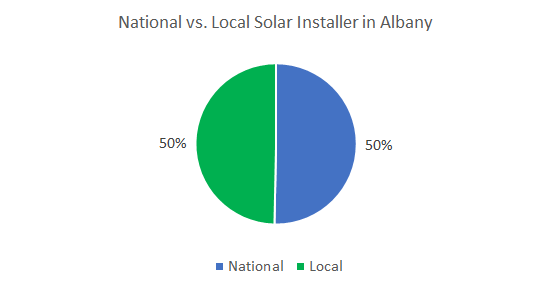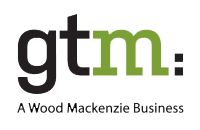Want to reduce your utility bill?
Turn up the AC in the summer without a huge bill?
Help the environment by switching to clean energy?
Great! These are all reasons that homeowners in have been going solar.
If you’ve started to do some initial research or talked to a few solar companies, your head may be spinning with investment return calculations, leasing vs. buying pros and cons, and panel and inverter options.
We understand – solar can be complicated at first, but it doesn’t have to be.
The research team at Ohmhome has compiled this guide to solar panels in to help you through the process. The good news for homeowners in thinking about going solar is that there is a lot of data available on cost, system sizes and financing options.
We’ve summarized this data, which is from government and non-profit sources (see list below) and was updated on September 2017. There is a lot of valuable information, so hang on (or just reference the table of contents)!
Table of Contents
[su_list icon="icon: angle-double-right" icon_color="#4dc7ec" class="table-of-cont"]- Cost of Solar Panels in
- Solar Savings in
- Solar Incentives in
- Solar Financing in
- Best Solar Companies in
Cost of Solar Panels in
The cost of solar in has dropped significantly in recent years due to the increase in module supplies and other supply chain efficiency improvements. According to the U.S. Department of Energy’s Q4-16 Sunshot report, the median price of residential solar in major markets was $4.20 per watt with the lowest 20% at approximately $3.50 per watt.
Solar Savings in
The following is a sample calculation for a 5kW System at $3.50 per watt or the lowest 20% range based on the Sunshot report.
| $17,500 | Estimated Panel Cost (5kW * $3.50) |
| ($5,250) | Less: Federal Tax Credit |
| $12,250 | Final Cost After Federal Tax Credit |
| Estimated Annual Savings | |
| Payback Period | |
| Total 30 Year Savings |
Solar Incentives in
State and federal incentives can significantly reduce the net cost of a solar system.
In addition to the Federal Tax Credit (30% of the cost of the system after state rebates and credits), homeowners can take advantage of state and local tax incentives. The most definitive source for state incentives in , is the DSIRE database for , which is managed by the N.C. Clean Energy Technology Center.
The vast majority of U.S. solar systems are connected to the grid because without a battery system, a solar homeowner will need to draw power from the grid when their system is not producing.
Utilities have many different net metering policies, or structures in which they compensate homeowners for sending power back to the grid, so it is important to understand the details in your local area.
has been graded a for net metering policies and for interconnection policies and procedures by freeingthegrid.org.
The IRS offers a 30% tax credit for solar systems based on the cost after state rebates and credits (discussed above). It is important to note that federal tax credit only applies to purchased systems and you need sufficient tax liability to claim the credit.
The federal solar tax credit was set to expire in 2016, but was recently extended through 2019, at which point it will start to decrease to 10% by 2022.
The IRS form 5695, Residential Energy Credits can be found here .
Solar Financing in
Solar financing is simple, right?!
There has been an increase in options for solar financing in as the competition for low-cost solar loans, leases and power purchase agreements has increased. If you are still scratching your head about the differences between leases, PPAs, and purchases, refer to our lease vs. buy guide to understand the implications of solar financing options.
Savings Calculations and Methodology (Per Month)
| Month | Available kW / m2 / day | Max savings / month |
|---|---|---|
| Jan | ||
| Feb | ||
| Mar | ||
| Apr | ||
| May | ||
| Jun | ||
| Jul | ||
| Aug | ||
| Sep | ||
| Oct | ||
| Nov | ||
| Dec |
The savings above are calculated using average utility rates in from the U.S. Energy Information Administration and solar radiation data from the National Renewable Energy Laboratory . The supporting calculations are (using August as an example):
| kWh per day per square meter based on solar radiation data | |
| x 25 | Square meters of a 5 kW solar system |
| x 18% | Solar panel efficiency (% of solar radiation converted to energy) |
| kWh of electricity produced per day | |
| x | Average kWh price of electricity in |
| x 31 | Days in August |
| Estimated savings in August |
Best Solar Companies in
If you don’t have the time to become an expert on solar equipment, economics and installations, a good shortcut is to find a trustworthy and capable solar company.
Choosing a solar installer is arguably the most important step of going solar for homeowners looking for the best solar companies in and we recommend reading our guide on how to choose a solar company. An important consideration is whether to use a large national installer or a local installer. In many cases, a local installer that does not have high customer acquisition costs can offer you a better deal.
Data Sources
Solar Panels in Albany New York Area: An Overview
All Data As of March 31st 2017
- Average Residential Solar System Size in Albany New York Area 7.97 Kilowatts
- Average Cost of Solar Panels in Albany New York Area: $29,939 BEFORE incentives ($20,957 AFTER federal incentives)
- Average Cost of Solar Panels in Albany New York Area: $3.83 BEFORE incentives ($2.68 AFTER federal incentives)
Cost of Solar Panels in Albany New York Area
In addition, it is important to look at pricing distributions vs. averages or medians if you want to understand what a good deal is on a solar system. Also, in general larger solar systems will cost less per kilowatt as there are certain fixed costs associated with an installation.
The average cost per watt of a solar panels in Albany New York area is $3.83 per watt (before incentives) and 25% of consumers paid less than $3.40 per watt. So if you are looking to get the best price for a solar system in the Albany New York Area and have an average sized system, you should find an installer below $3.50 per watt.
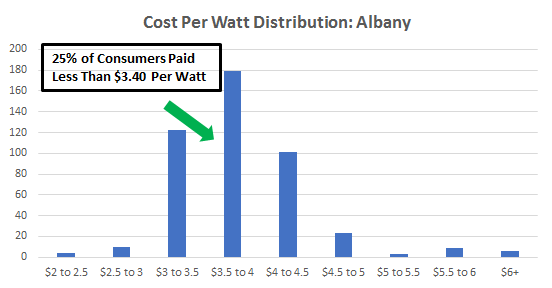
Solar Financing and Installation Trends in Albany New York Area
Residential solar installations have increased significantly in the Albany New York area, although growth slowed in 2016. From 2011 to 2016, installations have increased from 93 to 2,879. The slowdown in installation activity and installer turmoil, has created a buying opportunity for consumers. In Q1-2017, Albany solar installations fell 45% from Q1-2016.
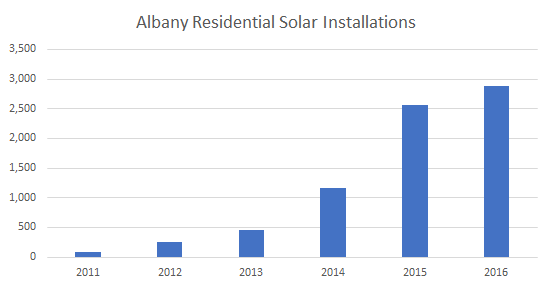
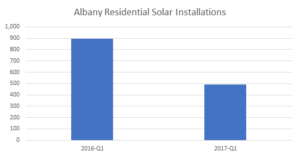
Solar Financing in Albany New York Area
In 2016, 42% of consumers purchased their solar system either with cash or a loan vs. and 58% used a lease or power purchase agreement (PPA) structure. Refer to our lease vs. buy guide to understand the implications of solar financing options. The percentage of consumers that purchased their solar system in the Albany New York area has increased in 2016 due to an increasing number of low-cost solar loans.
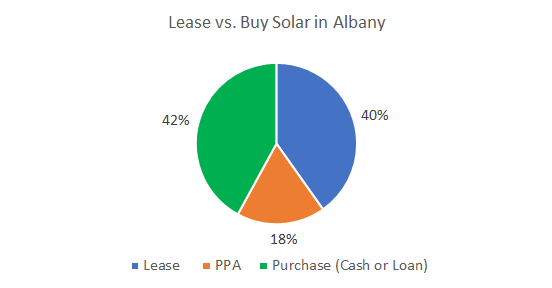
Top Solar Companies in Albany New York Area
Choosing a solar installer is arguably the most important step of going solar and we recommend reading our guide on how to choose a solar company. In the Albany New York Area in 2016, approximately 50% of consumers chose a local installer vs. 50% that chose a national installer (SolarCity, Vivint or Sunrun).
